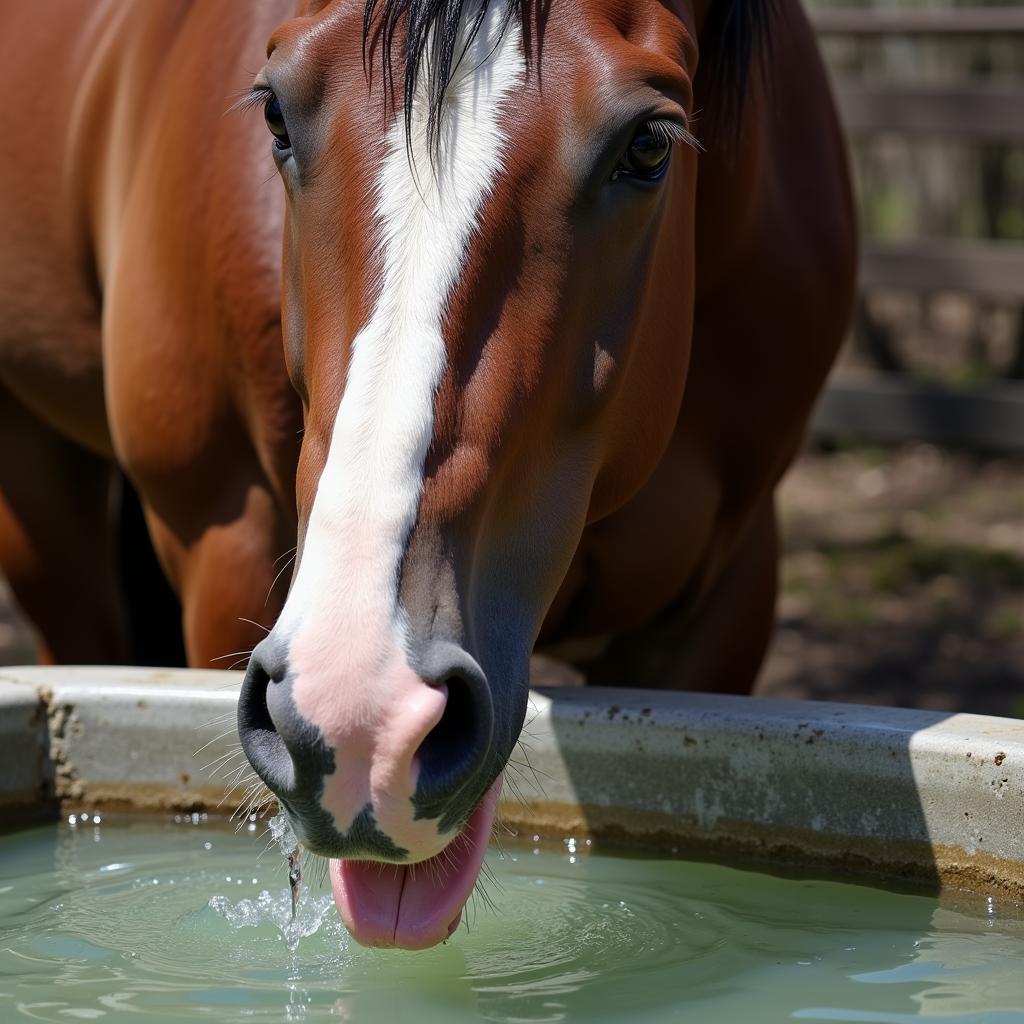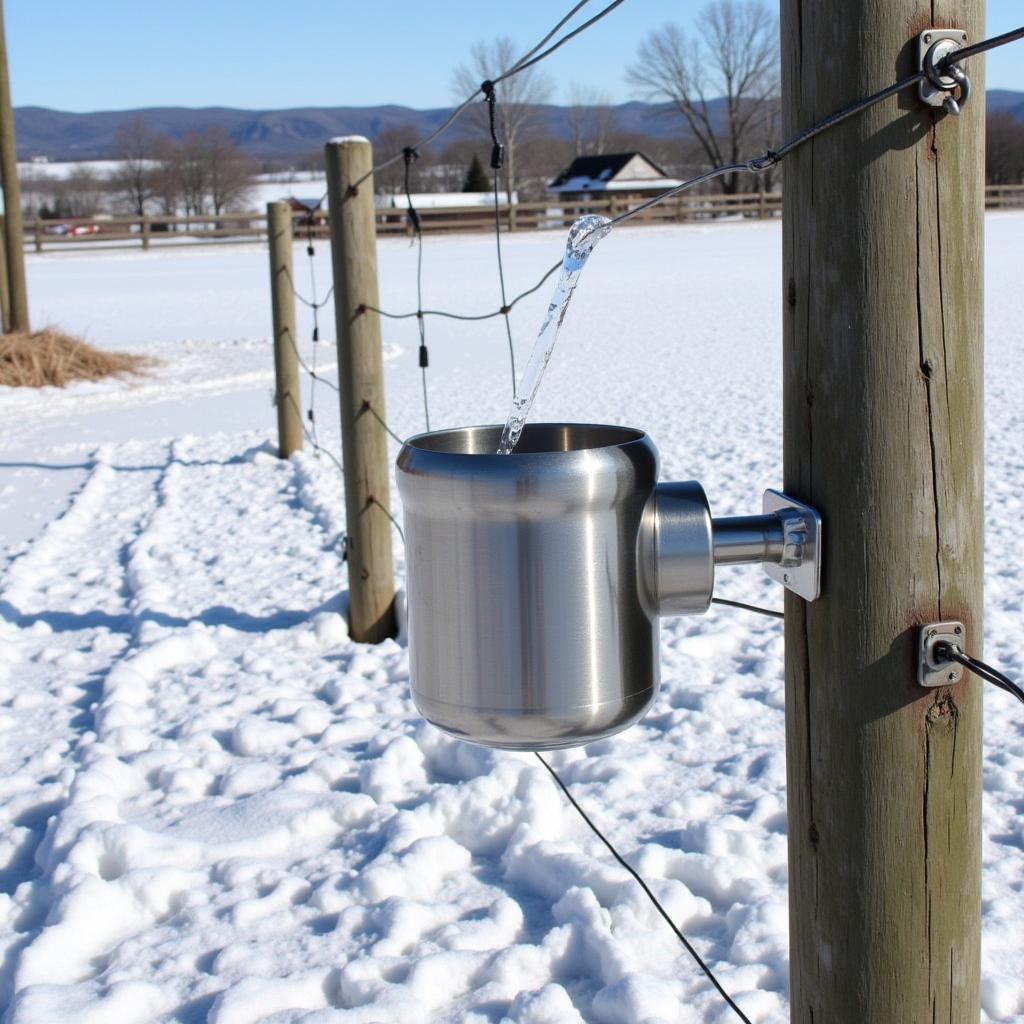Horse Cups, also known as automatic waterers, are essential tools for keeping your equine companions properly hydrated. Providing fresh, clean water is crucial for a horse’s overall health and well-being, and horse cups offer a convenient and reliable way to do so. This guide will delve into the different types of horse cups, their benefits, and how to choose the right one for your horse.
Understanding Horse Hydration Needs
Before exploring the world of horse cups, it’s vital to understand the importance of water for your equine friend. Horses need a significant amount of water daily, with factors like breed, size, activity level, and climate influencing their intake.
 Horse Drinking Water From a Trough
Horse Drinking Water From a Trough
On average, a healthy horse consumes 5-10 gallons of water per day. Dehydration can lead to serious health problems, including colic, kidney issues, and decreased performance.
Benefits of Using Horse Cups
Traditional water troughs, while common, come with their own set of drawbacks. Horse cups provide a range of benefits over conventional methods:
- Reduced Water Waste: Horse cups are designed to dispense water only when needed, minimizing spillage and evaporation.
- Cleanliness: With a closed system, horse cups prevent debris, algae, and insects from contaminating the water supply.
- Convenience: Automatic waterers eliminate the need for frequent refilling, saving you time and effort.
- Improved Hygiene: Horse cups discourage horses from standing in or defecating near their water source, promoting better hygiene.
Types of Horse Cups
The market offers a variety of horse cup styles, each with its pros and cons:
1. Bucket Style Horse Cups
These cups are typically made from durable plastic or stainless steel and operate using a simple float valve mechanism. As the horse drinks, the water level drops, triggering the valve to refill the cup.
2. Heated Horse Cups
For colder climates, heated horse cups are a game-changer. They prevent water from freezing during winter, ensuring your horses have access to liquid water year-round.
 Heated Horse Cup in a Snowy Pasture
Heated Horse Cup in a Snowy Pasture
3. Polypropylene Horse Cups
Known for their durability and resistance to cracking, polypropylene horse cups are a popular choice among horse owners. They are lightweight, easy to install, and often come with adjustable flow rates.
4. Stainless Steel Horse Cups
If you’re looking for a long-lasting and hygienic option, stainless steel horse cups are an excellent investment. They are rust-resistant, easy to clean, and withstand wear and tear.
Choosing the Right Horse Cup
Selecting the ideal horse cup for your needs involves considering several factors:
- Herd Size: Ensure the cup’s capacity aligns with the number of horses you have.
- Climate: Opt for heated cups in regions prone to freezing temperatures.
- Installation: Consider the location and ease of installation based on your barn or pasture setup.
- Durability: Choose cups made from sturdy materials that can withstand regular use.
Maintaining Your Horse Cup
Proper maintenance ensures the longevity and hygiene of your horse cup:
- Regular Cleaning: Clean the cup and valve mechanism regularly to prevent the buildup of algae, mineral deposits, and debris.
- Check for Leaks: Inspect the cup and connections for any leaks and address them promptly.
- Winterization: Drain and store horse cups properly during winter if they are not heated models.
Conclusion
Investing in horse cups is a smart decision for any horse owner prioritizing their animals’ well-being. By providing a constant source of clean and fresh water, horse cups contribute significantly to equine health and happiness. Remember to choose the type of cup that best suits your needs and maintain it regularly to enjoy its benefits for years to come.
FAQs About Horse Cups
1. How often should I clean my horse cup?
Cleaning frequency depends on usage and water quality. It’s recommended to clean the cup and valve mechanism at least once a month, or more often if you notice buildup or debris.
2. Can I install a horse cup myself?
Yes, most horse cups come with detailed installation instructions. However, if you are unsure about plumbing or electrical work, it’s best to consult a professional.
3. What is the average lifespan of a horse cup?
With proper care and maintenance, a high-quality horse cup can last for several years.
4. Do horses need access to water at all times?
Yes, horses should have access to fresh water 24/7. They often drink multiple times a day, and restricting water can lead to dehydration.
5. Are heated horse cups energy-efficient?
Modern heated horse cups are designed with energy efficiency in mind. They typically consume a small amount of electricity, especially when compared to the potential veterinary costs associated with dehydration.
Need Help With Horse Care?
For more information on horse care, check out our other helpful articles:
If you have any further questions or need assistance with your horse’s needs, don’t hesitate to contact Justus Horses USA. We are dedicated to providing exceptional care and support for your equine companions. Call us at 0772127271, email us at [email protected], or visit us at QGM2+WX2, Vị Trung, Vị Thuỷ, Hậu Giang, Việt Nam. Our dedicated customer service team is available 24/7 to assist you.